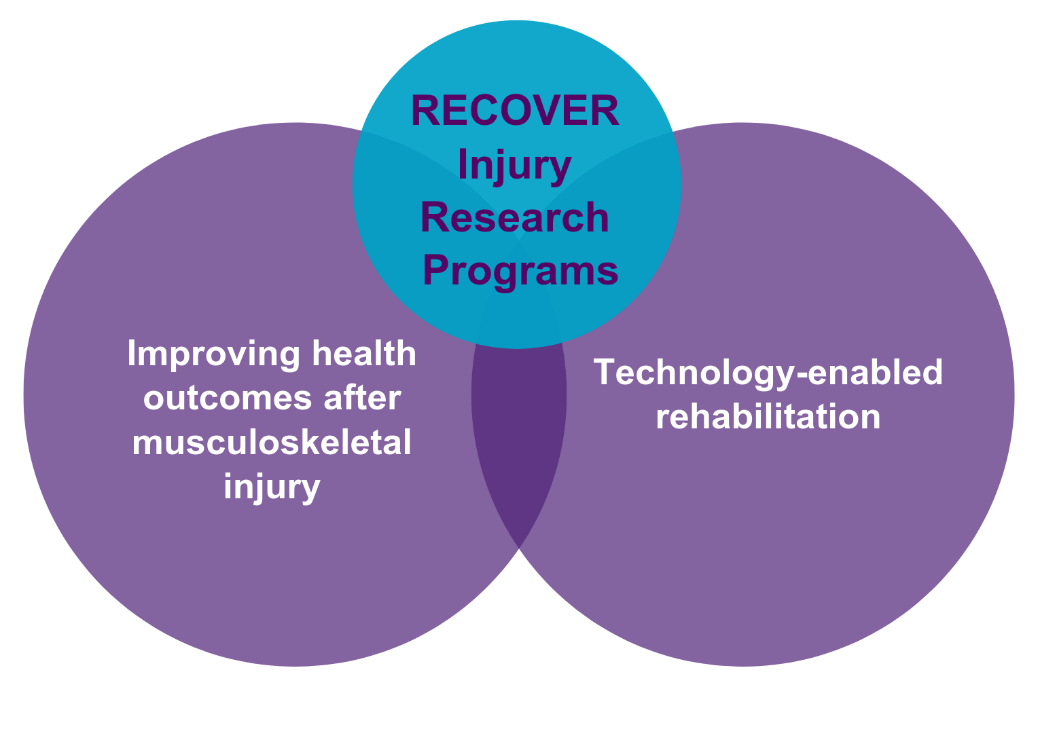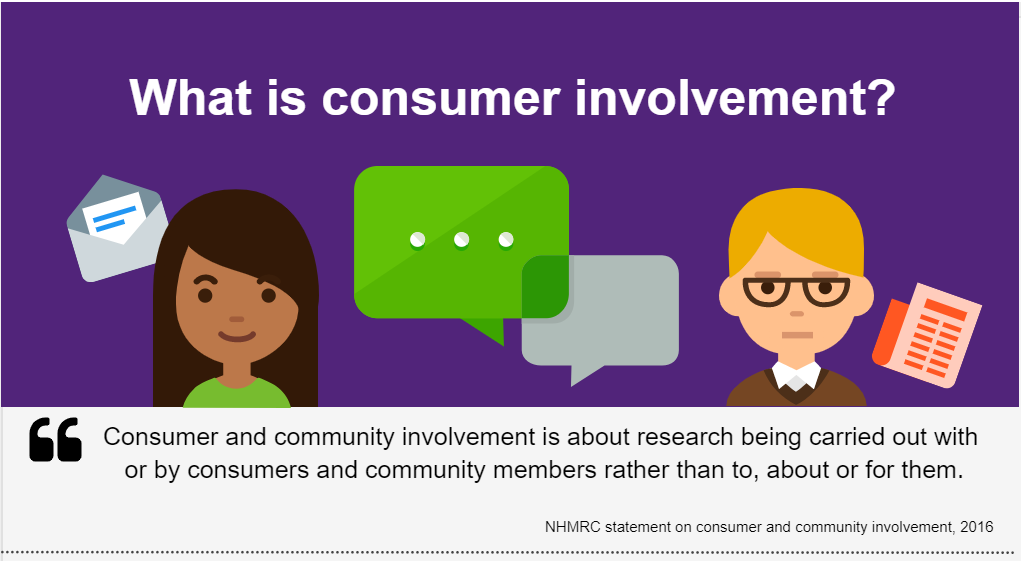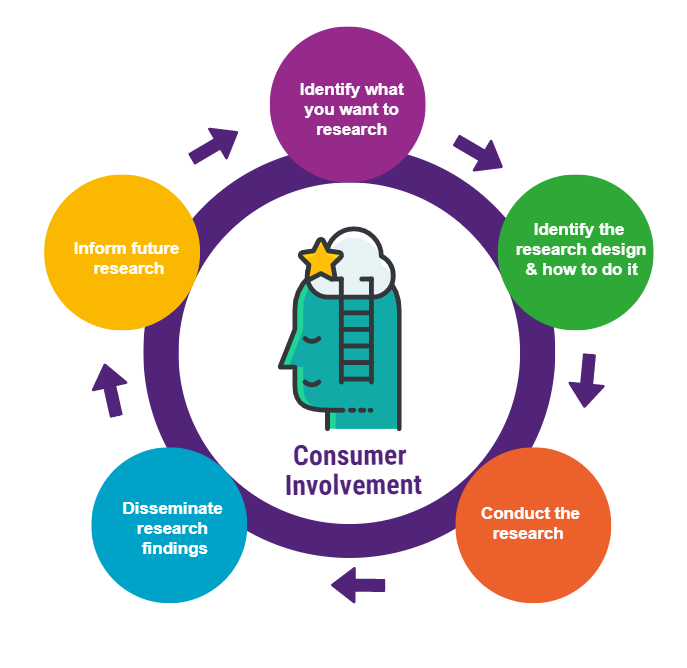Consumer involvement framework
Inspired by the co-design and research partnership work conducted by other research groups, RECOVER Injury Research Centre at The University of Queensland embarked on a journey to develop and implement a genuine consumer engagement strategy. The strategy aims to involve consumers and community members across the entire research spectrum. The development of a Consumer Involvement Framework is an essential part of this strategy.
View our poster presentation here (PDF, 1 MB).
Background
RECOVER Injury Research Centre conducts research to improve the lives of people who have had an injury, especially injuries caused by road traffic crashes.
There are two research streams at RECOVER, which intersect to produce research designed to optimise the recovery process following injury.

RECOVER's research focuses on:
- Better treatments
- Better predictors of recovery
- Better service delivery (e.g. using technology)
- Better support for returning to everyday life and work
Some examples of research conducted at RECOVER include:
- Research investigating pain, disability, and mental health of individuals after an injury such as whiplash, brain injury or musculoskeletal injury.
- Research that explores the challenges people with a pain condition experience during driving and other everyday tasks.
- Research designed to identify people at risk of poor recovery following injury.
- Developing more effective and efficient health services supported by technology innovation.
Who are RECOVER consumers and community members?
RECOVER's consumer and community involvement program includes:
- People affected by injury and their families/caregivers
- Community groups or advocates that represent consumers
- The general community (with interest in RECOVER research activities)
Other end-users (sometimes called Stakeholders) of our research include:
- Health professionals
- Policymakers (e.g., Motor Accident Insurance Commission)
- Compulsory Third Party (CTP) insurance providers
What is consumer involvement in research?

Definition of consumer involvement
Consumer involvement can mean different things to different groups. Some research groups1 make a distinction between the terms' consumer involvement' and 'consumer engagement' and define the terms as:
"Involvement is consumers and community working alongside health professionals and researchers, in partnership, to shape what research or project is done, how it is carried out and how results are shared and applied in practice."
"Engagement involves the sharing of the findings and outcomes of a project."
At RECOVER, we have adopted the definition of consumer and community involvement as outlined by McKenzie and Hanley (2011)2, whereby consumers work in partnerships with researchers to shape decisions about research priorities, policy, and practice.
We, at RECOVER, believe that consumer involvement includes all the activities that encourage people with a lived experience of injury, their carers, health professionals and other interested community members to actively contribute to research. The level of consumer engagement can vary across the research spectrum and within different research projects.
Further, we engage (and inform) consumers, community members and stakeholders to share our research findings via several mechanisms:
- Annual research symposiums
- Consumer engagement forums
- Workshops
- Website news items
- Social media channels
Opportunities for questions and feedback is provided for consumers in all engagement activities.
Benefits of consumer involvement
Involving consumers in research is a way to make research more relevant to community needs. It can increase public awareness and confidence in research, improve accountability over public funds, and improve research findings' quality and reach3.
Other key benefits of consumer involvement include1:
- Improves the quality of research;
- Provides researchers with a unique perspective on people's lived experience; and
- Empowers consumers by having a 'voice.'
The role of the consumer
The role of the consumer representative4 is to:
- Keep health consumers at the centre of discussions;
- Raise consumer concerns;
- Speak beyond the clinical perspective by sharing emotional, spiritual, cultural, geographical, and financial perspectives;
- Provide connections to other consumers and consumer networks; and
- Provide feedback.
Consumer involvement framework
Background
Inspired by the co-design and research partnership work conducted by other research groups, the RECOVER Injury Research Centre at The University of Queensland embarked on a journey to develop and implement a genuine consumer involvement strategy. The strategy aims to involve consumers and community members across the entire research spectrum. The development of a Consumer Involvement Framework is an essential part of this strategy.
RECOVER would like to acknowledge consumers' valuable contributions to the Framework during our 2020 Consumer and Community Online Forum.
Purpose
The Framework's goal is to increase consumer engagement in all research phases conducted at the RECOVER Injury Research Centre.
We hope the Framework will support researchers to engage with consumers more often and more effectively. The Framework is designed to assist researchers in understanding:
- What consumer involvement is and why it is important;
- When and how consumer involvement can take place; and
- What strategies researchers can use to connect with consumers.
We hope the Framework will also support consumers to engage with researchers more often and more effectively. The Framework is designed to help consumers understand when and how they can engage with researchers at RECOVER.
Research and consumer involvement
How does involvement differ from research participation?
Consumer involvement in research is where consumers work with researchers to shape the research design and conduct research. The level of consumer involvement can vary across the research spectrum and within different research projects.
Research participation is when consumers are recruited to be participants in a project. Researchers collect data (information) from the participants.
Ethical considerations
Genuine consumer involvement is not research and should not require Human Research Ethics Committee (HREC) approval.
However, as consumer involvement is relatively new in research, researchers must carefully consider whether ethical approval may be required for certain activities.
The University of Queensland research ethics committee advises that researchers consider what they will do with information contributed by consumers.
For instance:
- Suppose you invite one or more consumers to be on the research team or an advisory group to contribute to the project concept or development. In that case, you do not need ethical approval.
- If you invite one or more consumers to review study recruitment material and provide feedback, you do not need ethical approval.
- If you bring in consumers for a focus group style of consultation at the design phase (or any stage) and wish to publish their contribution as part of your methodology, ethics approval is required.
Research cycle
The research cycle below demonstrates the usual sequential phases of a research project and adds two new steps:
- Identify the target consumer, and
- Identify the level of consumer involvement.
The research cycle reminds researchers to consider consumer engagement right from the beginning of a research study.

Types of consumer involvement
The International Association of Public Participation (IAP2) spectrum5 is a practical way to guide consumer involvement with health organisations6. RECOVER generated the following table based on the IAP2 spectrum and consumer involvement in other research settings7. The table provides concrete examples of consumer involvement activities that can occur within each of the research phases.

| Inform consumers about our research and activities. | Consult with consumers to seek feedback. | Actively involve consumers in research planning. | Partner with consumers through phases of the research cycle. | Consumers initiate research. |
Research Phase examples |
|
|
|
|
|
Planning Identify what you want to research. Generate a project plan which includes consumer involvement.
| Information about upcoming projects to be advertised:
| Consumers provide one-off feedback:
| Ongoing consultation and feedback with consumers about the direction of a research idea and plan. The consumer 'voice' is heard and incorporated. | Researchers partner with consumers in the preparation phase of a research project. Consumers are equal partners. | Research topic or direction initiated by community organisation or industry group. A project steering committee led by consumers.
|
Execution Project recruitment, data collection, analysis, and write up.
| Information about new and active research projects to be advertised:
| Opportunity for consumers to provide one-off feedback:
| Consumers involved in reviewing and contributing meaningfully to recruitment strategies. May assist in recruiting participants through consumer networks. | Consumers invited to be members of an advisory group. | Consumers are lead or co-investigators. Project decision making led by consumers. |
Translation Share findings. | Findings presented:
| Feedback sought from consumers:
| Consumer contributions acknowledged in publications. | Co-authorship of presentations or publications. | Consumer representatives lead the planning and execution of dissemination activities. |
How can researchers connect with consumers?
RECOVER researchers can connect with consumers through the following methods:
- Consumer web portal 'Get Involved.'
- For example, researchers can post advertisements on the 'Calls for consumer feedback' page.
- RECOVER consumer e-mailing list
- Consumer brainstorming/consultation forums
- RECOVER consumer advisory group (to commence in 2021)
- Health professionals and health professional organisations (e.g. GPs, Pharmacists, Physios, Occupational Therapists, Psychologists)
- Social media channels
- Printed flyers at places where injured consumers may go. For example:
- Health services (e.g. Pain clinics)
- Carer organisations
- Hospital and health services QLD Heath
Additional resources and training for researchers and consumers
The following resources are designed to inform consumers and assist researchers to conduct and embed consumer engagement in their research:
Telethon Kids Institute
For Consumers: An introduction to consumer and community involvement in health research https://training.telethonkids.org.au/courses/consumer-introduction/
Monash Partners Academic Health Science Centre.
For researchers: Consumer and community involvement training modules https://monashpartners.org.au/education-and-training/cci/
Health Consumers Queensland
Recruiting consumers: http://www.hcq.org.au/home/recruiting-consumers/
A guide for consumers partnering with health organisations: http://www.hcq.org.au/wp-content/uploads/2018/06/HCQ_ConsumerGuide.pdf
A Guide for Health Staff: Partnering with Consumers 2018. Brisbane: Health Consumers Queensland. http://www.hcq.org.au/wp-content/uploads/2018/06/HCQ_StaffGuide.pdf
Consumer and community engagement framework for health organisations and consumers 2017. Health Consumers Queensland. http://www.hcq.org.au/wp-content/uploads/2017/03/HCQ-CCE-Framework-2017.pdf
The Australian Clinical Trials Alliance
Consumer Involvement & Engagement Toolkit. The Consumer Involvement and Engagement Toolkit (the Toolkit) provides practical advice for researchers and research organisations wishing to conduct patient-centred clinical trials.
Published research involving consumers
Jenkinson B, Maxwell J, Bell A, Young, A., Smith, A.C., Christoffersen, A., Trevor, D., Young, L., Russell, T. Bringing researchers to the consumer table: The process and outcomes of a consumer roundtable on telehealth. Journal of Telemedicine and Telecare. 2023;0(0). doi:10.1177/1357633X231188536
Cox R, Kendall M, Molineux M, Miller E, Tanner B. Consumer engagement in occupational therapy health‐related research: A scoping review of the Australian Occupational Therapy Journal and a call to action. Australian Occupational Therapy Journal. 2020.
Project team
Members of the Working Group
Ms Alison Bell (Chair), Knowledge Translation Officer, RECOVER
Dr Carrie Ritchie, Senior Research Fellow, RECOVER
Dr Atiyeh Vaezipour, Research Fellow, RECOVER
Previous members
Professor Trevor Russell, Director, RECOVER Injury Research Centre
Ms Hannah Fannin, Administration Officer, RECOVER
Ms Amelia Ince, Administration Officer, RECOVER
Dr Jane Nikles, Principal Research Fellow, RECOVER
Professor Deborah Theodoros, Former Director, RECOVER Injury Research Centre
Dr Rutger de Zoete Research Fellow, RECOVER
Ms Sarah Robins, Senior Research Assistant, RECOVER
Dr Esther Smits, Research Fellow, RECOVER
Dr Brooke-Mai Whelan, Research Fellow, RECOVER
Acknowledgements
RECOVER Injury Research Centre is a joint initiative of the Queensland Motor Accident Insurance Commission (MAIC) and The University of Queensland.
References
1. For example, Monash Partners. Academic Health Science Centre https://monashpartners.org.au/education-and-training/cci/
2. Anne McKenzie and Bec Hanley (2011) Consumer and Community Involvement in Research: A training workshop for researchers on implementing involvement.
3. Statement on Consumer and Community involvement in Health and Medical Research, National Health and Medical Research Council (2016), Consumers Health Forum of Australia.
4. Health Consumers Queensland (HCQ) http://www.hcq.org.au/ Consumer perspectives and consumer role lists provided by HCQ and adapted with permission.
5. International Association of Public Participation (2016). IAP2 Public Participation Spectrum. Available from: https://www.iap2.org.au/Resources/IAP2-Published-Resources
6. Health Consumers Queensland. Consumer and community Engagement Framework 2017. Brisbane: Health Consumers Queensland.
7. Cox R, Kendall M, Molineux M, Miller E, Tanner B. Consumer engagement in occupational therapy health‐related research: A scoping review of the Australian Occupational Therapy Journal and a call to action. Australian Occupational Therapy Journal. 2020.
